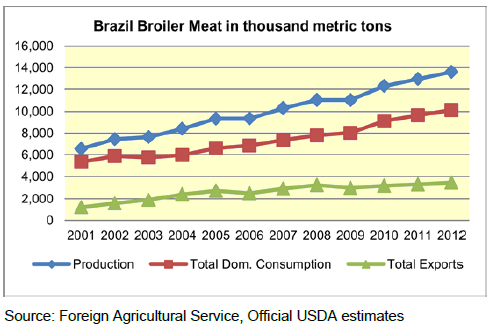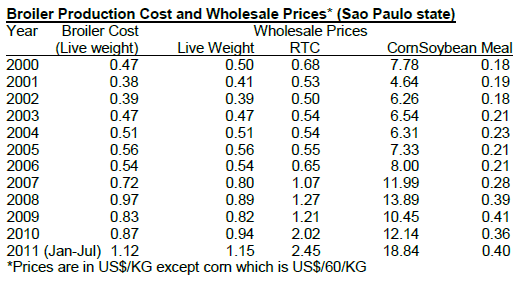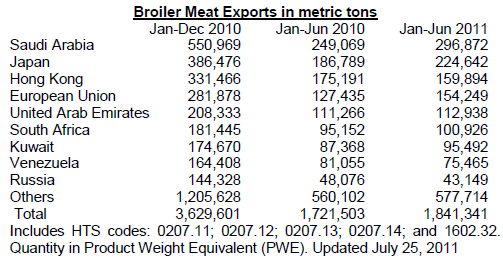



International Egg and Poultry Review: Brazil
BRAZIL - This is a weekly report by the USDA's Agricultural Marketing Service (AMS), looking at international developments concerning the poultry industry. This week's review focuses on Brazil's poultry industry.Broiler production in Brazil has grown at an annual rate of 2.95 per cent between 2001 and 2011. Increased production is supported by strong domestic demand and by increased exports. Brazil’s economy grew by 7.5 per cent in 2010, fuelling rising household income and supporting demand for animal proteins. Brazil’s central bank posted market expectations of a 3.51 per cent increase for 2011 and 3.70 per cent in 2012.

Production is forecast to reach 13.60 million metric tons (MMT) in 2012, up five per cent from 2011 (12.95MMT). Broiler producers are expected to have positive returns as feed costs are likely to remain stable. The federal government can use estimated higher corn stocks through auctions, where the government subsidises the transportation costs from the major producing areas in the Center-West to the poultry-producing areas in the Northeast, thus reducing the pressure on corn prices to the main poultry-producing areas of the Southeast of Brazil. Trade sources estimate up to 75 per cent of the corn crop is likely to be biotech (genetically modified; GM), which is expected to increase yields. US$67 billion in credit lines at subsidised interest rates was announced for the upcoming 2011/2012 crop season (October 2011 – September 2012.)

Broiler exports in 2011 were higher than expected due to higher exports to Saudi Arabia, Japan, China and the EU. The value of those exports in 2011 will likely increase by over 20 per cent as the average export price of chicken rose from US$1,660 per metric ton (MT) in 2010 to US$2,020 per MT in 2011. Exports are forecast to grow an additional five per cent in 2012, driven by higher sales to the Middle East. The Brazilian anti-trust regulator (CADE) approved the merger of Sadia and Perdigão, Brazil’s two largest food processors, to create Brazil Foods S.A. (BRF). The new company will hold approximately 35 per cent of the domestic market share and more than half of the export market. Brazil Foods is constructing a processing plant in the UAE with a total processing capacity of 80,000 metric tons. The strategy in the Middle East, which accounts for nearly 32 per cent of the company’s exports, is to produce further processed broiler products.

Recently, the South African poultry industry requested an investigation into alleged dumping of frozen meat of chickens, whole birds (HS 0207.12.90) and boneless cuts (HS 0207.14.10), originating in or imported from Brazil, South Africa’s leading supplier of poultry meat. The International Trade Administration Commission (ITAC) of South Africa agreed to investigate the imports and preliminary findings are expected in early 2012.
The US was the leading supplier of chicken meat to South Africa until South Africa imposed anti-dumping duties on bone-in broiler meat imports in 2000. In 2005, the duty was extended to 2011. The current five-year anti-dumping duty on chicken meat portions imported from the US expires in November 2011 but a Sunset Review has been initiated and the protections will continue until the Sunset Review is complete.

Brazil is concerned about currency exchange rates and the potential impact on international trade. In September, Brazil submitted a proposal to the WTO asking for the examination of possible trade tools for responding to currency fluctuations. The proposal was submitted to the WTO’s Working Group on Trade, Debt and Finance, and asked for a workshop to take place in 2012 to examine ‘available tools and trade remedies in the existing multilateral system, if any, to compensate for or otherwise redress those currency fluctuations that may impair commitments undertaken by Members in successive rounds of negotiations’. In a speech on 6 October 2011, WTO Director-General, Pascal Lamy, addressed concerns about monetary policies, saying "This is why we need the G-20 to make headway on the issue of reform of the international monetary system, in which Germany and Brazil have taken the lead."
Further Reading
| - | You can view the full report by clicking here. |











